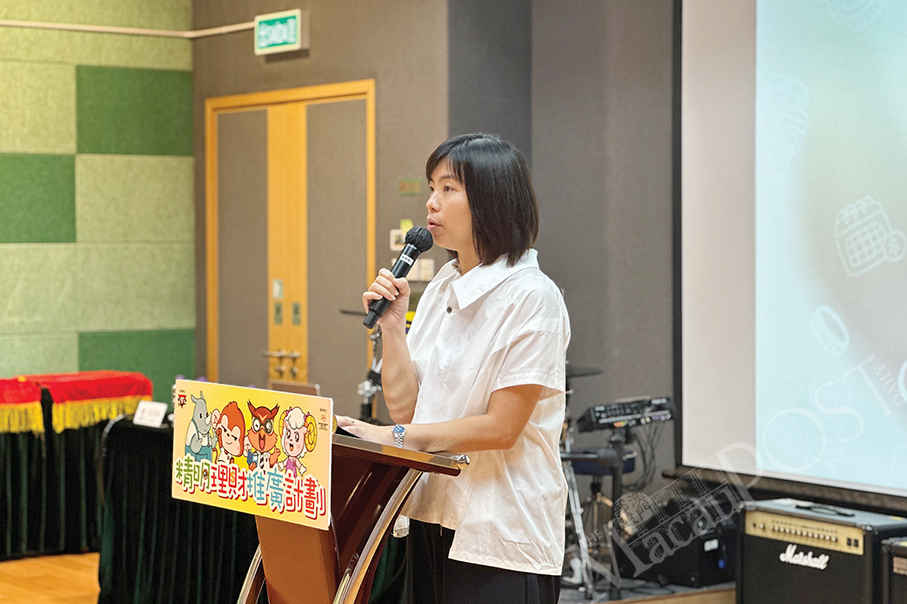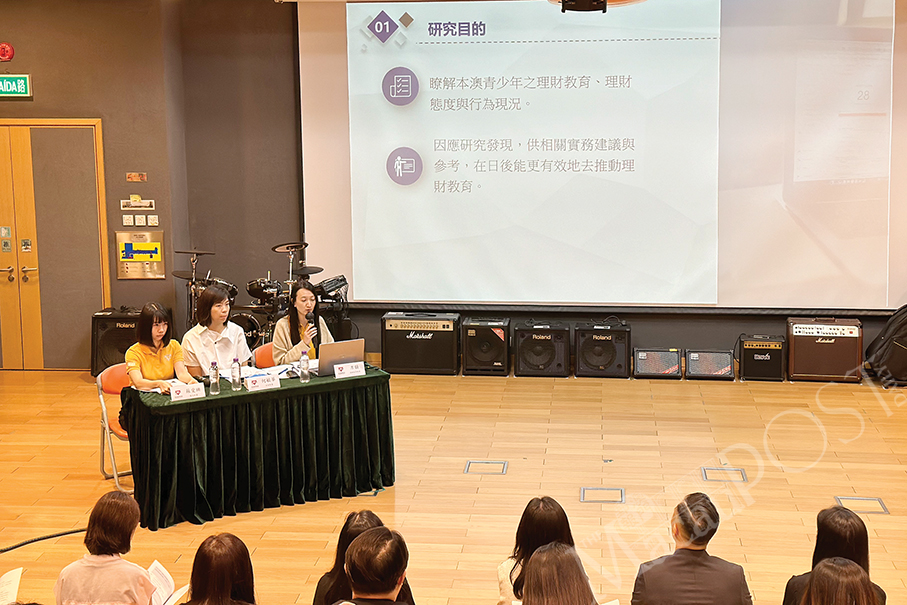Financial education is indispensable to building healthy and positive financial values, and the findings of a survey carried out by the Young Men’s Christian Association of Macau (YMCA) show that the attitudes and behaviours of young local people towards financial management are generally positive.
The survey was conducted last month to collect views on financial education, attitudes and behaviours of 1,460 Chinese-speaking local students in upper primary, junior secondary and senior secondary schools aged between nine and 22.
Prior to the release of the survey findings at the Healthy Life Education Centre in Areia Preta yesterday afternoon, on the occasion of the 10th anniversary of the YMCA Smart Financial Programme yesterday, the programme manager, Heidi Ho Man Wa, gave a brief introduction to the effectiveness and objectives of the programme, saying that with the strong support of the Social Welfare Bureau (IAS), the association, taking into account Macau’s unique economic, industrial and social environment, as well as the characteristics of children and teenagers at their respective developmental stages, launched in 2014 a raft of localised, systematic and diversified financial education programmes. Ho said: “To date, our programme has made its way to 90 percent of the schools in Macau, and it has become an important benchmark in promoting the popularisation of financial education. We provide comprehensive financial education to students from upper primary to senior secondary levels, helping them understand currency knowledge, identify consumer traps, build up personal credit awareness and master financial protection strategies, as well as enhancing their resilience to gambling disorders”.
“Financial education is an indispensable lesson in life,” Ho added, pledging that the association would, in its attempt to keep pace with the times and capturing the latest social and financial trends, further improve and optimise the content of its financial education to provide students with more practical and pragmatic financial management knowledge, while also further deepening its cooperation and liaison with schools, families and the community, joining hands with parents and teachers, so that the relevant stakeholders can all become copromoters of financial education.
According to the findings, with the survey’s highest mean score of five, the average score for overall financial attitude score was moderately high at 3.89, with “financial responsibility and decision-making” scoring the highest, at 4.01, followed by “money management and savings” as well as “credit and borrowing”, both at 3.83, in which students mostly considered that “the habit of saving money is very important” and that “knowing how to manage finances can be of great help to one’s present and future life”, indicating that the survey’s respondents generally have a positive attitude towards financial management, and expect to have the relevant financial management knowledge to make rational financial decisions.
The findings noted that the younger the age or the lower the grade, the more positive the financial management attitudes or behaviours of the students are. However, as the age or grade rises, the amount of money available for students to use on their own increases, which leads to less prudent financial management behaviours among students in higher grades. It also noted that in comparison with their male counterparts, female students are more negative in their financial behaviour, especially in money management and savings, with their spending patterns being less rational and prone to impulsive spending.
Ho’s speech mentioned that financial management education should not be confined to the school campus as the social atmosphere and family culture also play an important role, and the findings show that the more positive and prudent the parents’ financial management behaviours are, such as tracking their expenses and saving money, learning about financial management information, and even making investments and buying insurance, the more positive and prudent their children’s financial management attitudes and behaviours will be.
According to the findings, about half of the students considered their financial education level to be average or insufficient, of which 62.9 percent expected to enhance their knowledge on “saving”, followed by “rational consumption”, “financial career planning”, “budgeting”, “investment risk”, “gambling prevention”, and “loans and debts”.
At the press conference, YMCA representatives urged schools to set up regular financial management curriculums in order to enable their students to cultivate an interest in financial management and absorb relevant knowledge, while also calling on parents to a play a good role as guides to help their children develop correct money concepts and values.

YMCA Smart Financial Programme Manager Heidi Ho Man Wa delivers a speech yesterday.

Young Men’s Christian Association of Macau (YMCA) representatives present the findings of their survey on the attitudes and behaviours of young local people towards financial management, during yesterday’s press conference at the Social Welfare Bureau’s (IAS) Healthy Life Education Centre in Areia Preta. – Photos: Yuki Lei









